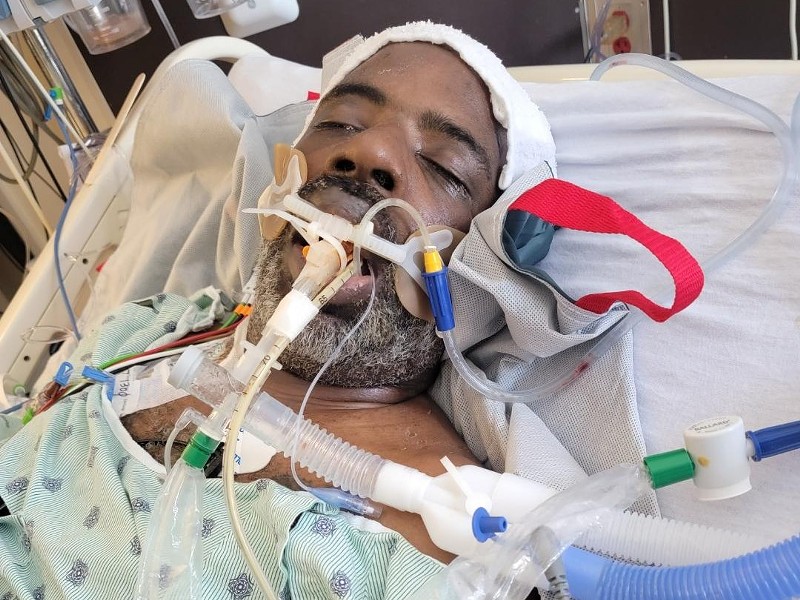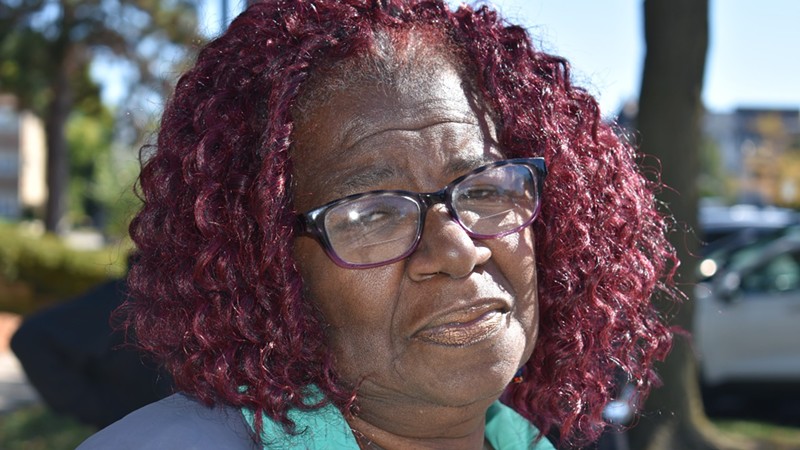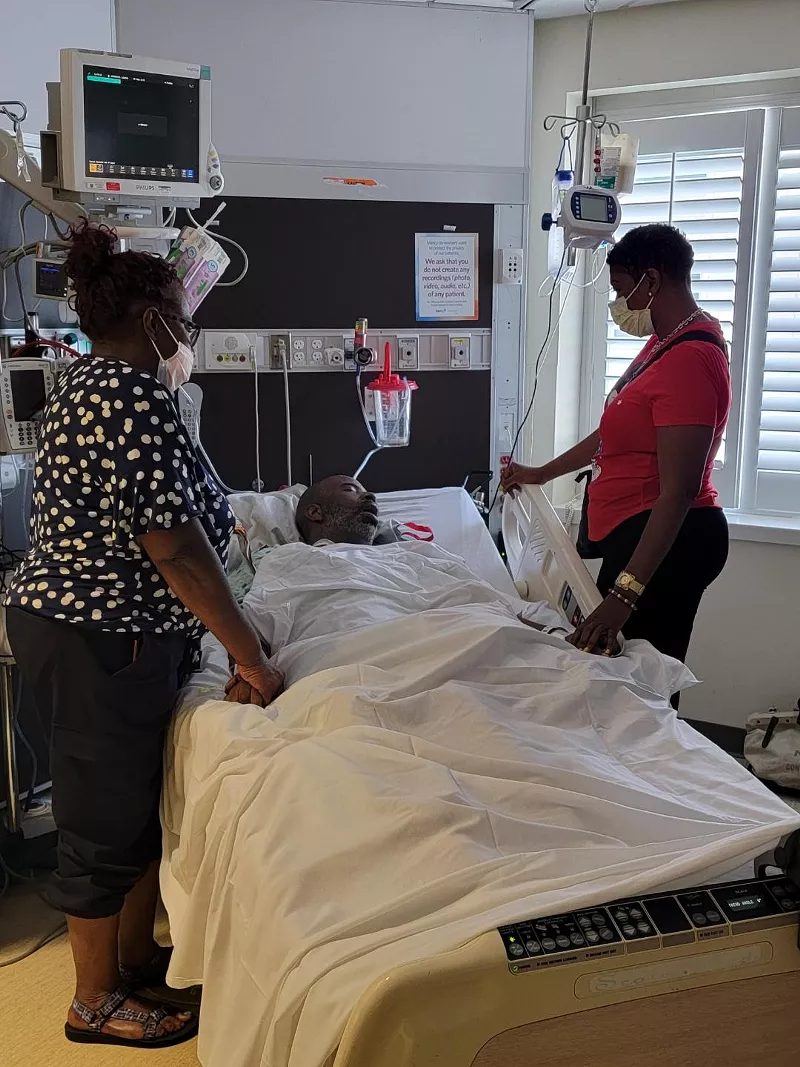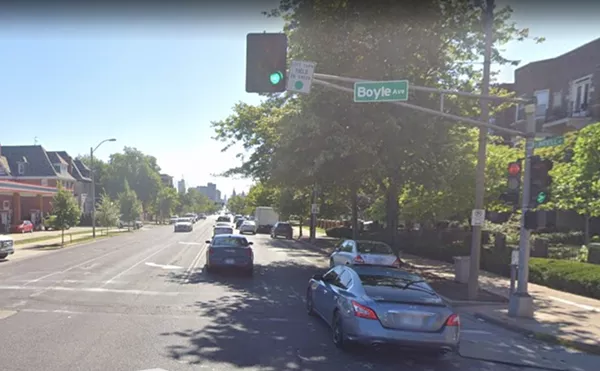LeVaughn James died in Missouri Department of Corrections custody June 1, less than two weeks before he was to be released. His mother, Mary, had already sent the 45-year-old brand new clothes to wear home.
Now, almost five months later, Mary says she can't find any closure because she still doesn't know the circumstances surrounding her son's death. That's not for a lack of trying. Her lawyer Brandon Jackson has filed numerous Sunshine requests, but the MODOC denies them anything of substance in what Jackson says are flagrant violations of state transparency laws.
Amid growing criticism of how governments in St. Louis handle Sunshine requests, relatively little attention has been paid to what some call egregious flouting of transparency laws by a state agency in whose custody 105 men have died so far this year.
On almost-daily phone calls with his mom, he talked about how things would be different this time when he got out. He had a fiancé, Kimberly Campbell. Mary says that representatives from parole had already visited Campbell's house and deemed it a suitable place for him to live while on parole.
But when Mary didn’t hear from her son on May 22, she began to feel uneasy. She thought maybe he’d gotten in trouble and lost phone privileges. Two days later, she called the prison and was connected to her son’s case manager.
“He’s not here,” was all the case manager said.
Mary was told that if she wanted any more information she was going to have to talk to the warden. But the warden was in a meeting and couldn’t talk on the phone.
So the next day Mary contacted the Missouri Department of Corrections Constituent Services in Jefferson City.
A representative there told her LeVaughn had been involved in an incident in Bowling Green and he had been transferred to Mercy Hospital in St. Louis.
“It looked like he got a hold of some K2,” Mary says the MODOC staffer told her. K2 is a generic term for synthetic marijuana. The staffer added: “If you can get to St. Louis, you should.”
The next day Mary, her sister and step-daughter were in St. Louis at LeVaughn’s bedside.
“When we got there, he was barely holding on,” Mary says.
LeVaughn was hooked to a ventilator and feeding tube, his eyes barely open.
The doctor told her his brain had been deprived of oxygen for an extended period of time, and he was brain dead. “If he came through this he wouldn’t be anything but a vegetable,” Mary remembers the doctor telling her.
He died five days later, 13 days before he was supposed to be a free man.
Immediately, for Mary, the pain of losing her son was compounded by the unanswered questions about how he died.
She wondered how synthetic marijuana had gotten into the prison, how it had put him in a comatose state and even if synthetic marijuana was to blame for her son's death. She couldn't get access to an autopsy. She didn't know what time her son went into distress or how long it took to get him medical attention.
Even before LeVaughn's funeral, Mary made it her mission to figure out what had happened to him.
“The warden told me they were getting all the information together pertaining to LeVaughn," Mary says. "But still nobody has contacted me since then.”
That was in June, and Mary quickly enlisted the help of Jackson, an attorney formerly with Brown and Crouppen and now with ArchCity Defenders, who has now been in a back and forth with the MODOC for almost five months on Mary’s behalf. It started on June 17 when Jackson requested a slew of documents from the Department of Corrections, all of which he was certain ought to be available under the state's Sunshine law. He asked for the department’s entire investigative file related to LeVaughn’s death, the department’s policies regarding an inmate’s death, and policies and protocols related to controlled substances.
"My understanding is that the Missouri Department of Corrections has internal investigators that they employ when something serious happens. There may be an investigative file with pictures, documents and interviews. We requested that," Jackson says.
He adds: "We did not receive anything."
The MODOC has given Jackson some documents related to LeVaughn’s prior incarceration. “But as far as I can tell they’ve given us none of the substantive information we’ve requested,” Jackson says.
This refusal to release these records is a violation of state transparency laws, Jackson says.
That's because Jackson is making these records requests under a specific subsection of the Sunshine law, which says that the family of a person who dies in law enforcement custody, or an attorney working on that family’s behalf, is allowed to access records regarding the death even if those records would otherwise be closed.
“The law makes a clear exception for people like Ms. James, and their attorneys,” Jackson says.
However, Jackson says the Department of Corrections claims that the provision of the Sunshine law under which Jackson is requesting the investigative file does not apply to them because they say they are not a law enforcement agency.
After months of back and forth, today in Cole County court, Jackson along with attorneys from the ACLU of Missouri filed a lawsuit against the MODOC on Mary James' behalf. The suit accuses the agency of "knowingly and purposefully" violating transparency laws and not adequately explaining the delays in providing records.
The suit argues that the MODOC is a law enforcement agency, as evidenced by the fact that they investigate crimes that happen within their facilities. The MODOC also enacted a program that allows probation and parole officers to arrest individuals suspected of violating the terms of their probation or parole.
The RFT reached out to the department on October 4 to ask if they consider themselves a law enforcement agency or not as well as what sort of information about an inmate's death families are allowed to have access to. We followed up two weeks later but never heard back.
Right now, Jackson and Mary can’t determine if the department followed the proper protocols following LeVaughn’s death because the department won’t release what those protocols are.
Jackson says he wants to know if the agency looks into who the inmate talked to on the phone in the hours before their death, or if the investigators interview cellmates. Does MODOC contact local law enforcement? Run a toxicology test?
“There is a universe of information and rules that we don’t know about,” Jackson says.
The Mary James lawsuit isn't the only one against the MODOC alleging Sunshine Law violations. In another suit filed in August of last year, a Cole County judge has already agreed the agency is flouting state transparency laws.
The judge's ruling was in response to a lawsuit filed by the family of Jahi Hynes, who died April 4, 2021, in MODOC custody.
The lawsuit states that Corrections officials told the Hynes family nothing about Jahi's death other than that he "hurt himself."
Similar to James, the Hynes family requested the full investigation report related to Jahi's death, as well as numerous other materials.
When pressed on why the department wasn't releasing information about Jahi's death, MODOC allegedly contended they were not a law enforcement agency and that releasing information about inmate death threatened “institutional security.”
Also, according to the lawsuit, Corrections’ attorneys stated that investigation reports were closed records because some contained information "which would benefit any individual looking for an opportunity to disturb the institution and its inhabitants." Department attorneys conceded that this "exception does not cover the entirety of the investigation reports.”
However, the state Sunshine law seems to be pretty straightforward on this exact circumstance: "If a public record contains material which is not exempt from disclosure as well as material which is exempt from disclosure, the public governmental body shall separate the exempt and nonexempt material and make the nonexempt material available for examination and copying."
The Hynes family sued for the records in August 2021. In a summary judgment issued in April, Cole County Judge Daniel Green ruled that the Corrections department "violated the Sunshine Law by denying Plaintiff access to ‘offender records’ and the reports and records pertaining to the investigation of Jahi Hynes' death."
MODOC has since appealed, and the case is still working its way through the courts.
Executive director of the nonprofit Missouri Prison Reform Lori Curry says she knows all too well the difficulties involved in getting records from the MODOC.
"It's definitely not just families" that have trouble getting information they believe they are legally entitled to, Curry says.
Her own nonprofit requested internal communications among department personnel in May. In June they paid the $532 the department said the records would cost to release. To date, Missouri Prison Reform has only gotten around 20 percent of the material they've been promised.
Curry says that every week her organization files a Sunshine request for the names of inmates who have died while in MODOC custody. This information, Curry says, wouldn't be made public if the nonprofit didn't proactively ask for it. Since they began this practice she says on at least three occasions she's been contacted by families who have had a loved one die while in custody, but whose names were missing names from death log.
Mary James says she was eventually able to get her son’s body from the Pike County coroner and sent to Chicago so that the family could hold a funeral. He was buried on June 11.
“Sure he did bad things, but he never was one to hurt anyone,” Mary says. “He assured me he had gotten himself together and was not going back to prison. He was going to get out, get a job and marry his fiancé.”
This project was completed with the support of a grant from Columbia University's Ira A. Lipman Center for Journalism and Civil and Human Rights in conjunction with Arnold Ventures.
CORRECTION: The lawsuit referenced in this story was brought by the ACLU of Missouri, not the ACLU national organization.
We welcome tips and feedback. Email the author at [email protected]
or follow on Twitter at @RyanWKrull.












